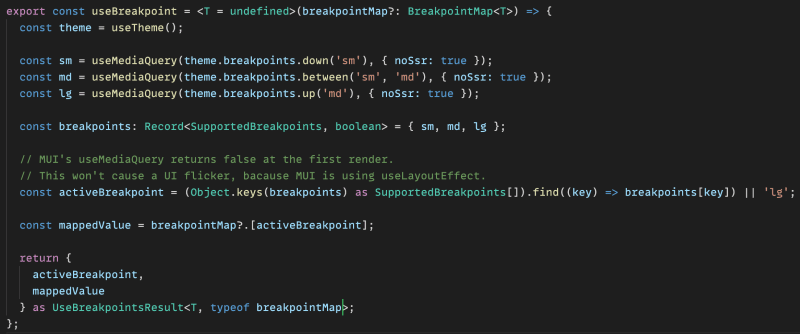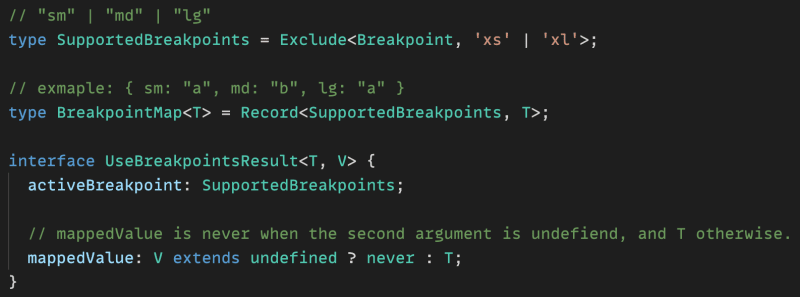In this example, the return type of a hook depends on whether the argument is passed.
So here we have a useBreakpoint hook that, from the screen resolution, gives us the current breakpoint we're on; and it also allows us to optionally pass a breakpointMap, which is just an object that maps a breakpoint to some styles we want to change according to the current breakpoint (activeBreakpoint).
The Objective
Tell Typescript to make mappedValue's type undefined only if the breakpointMap(the argument) is not passed.
If it is passed, we want it to be defined as the value of the mapped object.
At the return we let Typescript know the hook's return type by using type assertions.
We can use the power of Generics as if they were function arguments.
UseBreakpointsResult receives 2 generic types T and V.
-
Tis the type of the value mapped to each breakpoint, for example:
const breakpointMap = { sm: "a", md: "b", lg: "c" }
Here, T will be a string, because "a" or "b" or "c" are the values there are mapped.
-
V- we passtypeof breakpointMap, which can either beundefined(no arguments passed) orT(a map object was passed).
The important thing to understand here is that mappedValue's type won't be with a union separator (undefined | T), it's either T or undefined.
That is done by asking: V extends undefined ? never : T
If
Visundefinedthen we don't want themappedValue, otherwise letmappedValue's type beT.
Why is it so critical to tell Typescript mappedValue should either be undefined or T?
If we don't check the type of the argument then the type is either T | undefined, which means we have to check if it's undefined every time before we render our component, or add a Non-null assertion operator, which will uglify the code unnecessarily.
Using vs. Not Using This Method
✅ Using
- When the
breakpointMapis not passed the type will beundefined:
- When the
breakpointMapis passed the type will be, in this instance,string:
⛔️ Not Using
Here we define the mappedValue's type to be T | undefined.
- When
mappedValue's type isT | undefinedwe'll get this error:
⚡️ Even though we passed the breakpointMap! ⚡️
Press on Open Sandbox to play with the code 🎈
Typescript helps us to better communicate our intentions and understand others' intentions.
So be like this bird and go explore Typescript! 🗺 🦅















Latest comments (0)